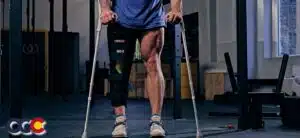A ruptured Achilles is the most common tendon rupture that can occur in your legs. The Achilles tendon connects your calf muscles to your heel bone. While it is a strong tendon, it can partially or fully tear, or rupture, if over extended.
Certain demographic and lifestyle factors can increase your risk for a ruptured Achilles. While gender and age are two key risk factors that none of us can influence – the majority of ruptured Achilles tendon injuries happen to men between the ages of 30-50 – there are several other risk factors that may be managed or minimized by lifestyle choices:
Maintain a healthy body weight: Excess weight puts additional strain on the Achilles tendon, thus making ruptures more likely. By maintaining a health body weight, or BMI (Body Mass Index), people of all ages and genders can reduce their risk of a ruptured Achilles.
Take a smart approach high-impact exercise: Especially with certain activities or when increasing intensity suddenly. Any sport that emphasizes running, jumping, quick pivots or change in direction tends to see a higher-than-average occurrence of Achilles tendon ruptures. Common examples include tennis, high-intensity cross training, soccer, and basketball. Similarly, any dramatic increase in your level of intensity can put you a higher risk for a tear.
Warm up well, weekend warriors: If you don’t get much activity during the week, but like to go “all-out” on weekends, be sure to really emphasize a good warmup, ease into your activity, and always remember to stretch. Keeping your body limber and staying warm throughout your activities can help to minimize the risk of a ruptured Achilles or other injury.
Know the potential risks of some antibiotics: Certain antibiotics, known as fluoroquinolones, may increase the risk of a ruptured Achilles tendon by causing damage to the tendon. While this type of antibiotic may also damage other tendons, the majority of cases are associated with weight-bearing tendons, and the Achilles, in particular. Doctors typically only prescribe such drugs under specific circumstances when the benefit of the antibiotic outweighs the risk of an Achilles tear. However, patients should be sure to review and understand the risks and benefits before taking any medication.
Understand that steroid injections also have a cost-benefit trade off: Steroids can reduce inflammation and joint pain but can also weaken tendons, including the Achilles when injected nearby.
Ruptured Achilles Prevention
In addition to knowing the risks there are a few things you can do to minimize your chances of an Achilles tendon rupture, including:
Keep your workouts diverse: Especially if you already have any of the other risk factors, be mindful of how frequently you participate in activities that demand a lot of running and jumping. This could include alternating between running and biking or swimming and taking rest days between court or field time.
Don’t go from zero to 60: If you’re starting a new routine or are thinking about rounding up the team for some glory-days court time, be smart and conservative. Don’t go from couch potato to working out 5 days a week; and try to resist getting overly competitive in a pickup game if you haven’t touched a ball in years. A good rule of thumb for increasing your effort is to do so no more than 10 percent per week. When you do exercise or compete, always warm up slowly and stretch before you really get going. Gently stretch key muscle groups, in particular your calves. Never bounce while stretching – instead make slow gradual motions.
Listen to your body: If you’re feeling sore or feel like an exercise or a move is too much, don’t ignore the warning your body might be giving you. Back off your intensity when you need to. This could mean alternating walking with running or replacing a hopping motion with a stepping motion in an intense exercise class.
How to tell if you’ve ruptured your Achilles and what to do next
Many people report feeling sudden, intense pain and hearing a snap or popping sound when their Achilles tears. Most also notice an immediate limit in their ability to walk normally. If you think you’ve ruptured your Achilles, you should seek prompt medical attention from an orthopedic specialist. They will be able to confirm the nature and severity of the tear and recommend the best treatment plan to get you back on your feet and active.
Whether you’ve partially or fully torn the Achilles, surgery is often the best solution to repair the damaged tendon. A foot and ankle specialist will reattach a fully ruptured Achilles or repair a partial tear. Patients must typically be off their foot or the foot and ankle may be immobilized for at least several weeks to allow the tendon to begin to heal. In some cases, immobilization without surgery is an option.
Full recovery from ruptured Achilles surgery takes time – around 6 months to get back to normal activities, if you’re following a good physical therapy plan.
Advanced Orthopedics & Sports Medicine Specialists has several foot and ankle surgeons who use the latest surgical and open repair techniques that minimize the incision size and provide the best patient outcomes. Get in touch for more information or to schedule an appointment with one of our foot and ankle specialists.










